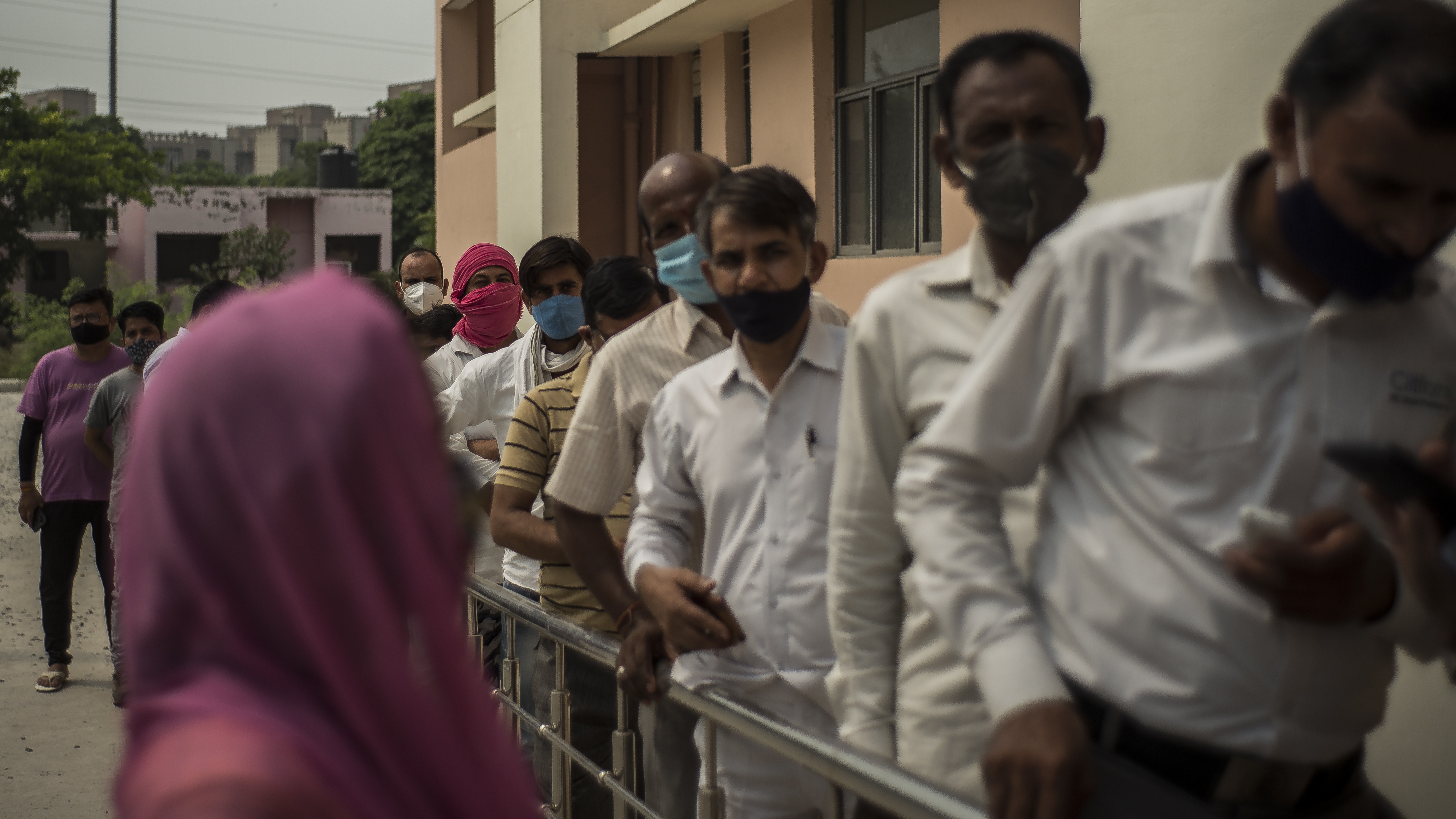‘Delta plus’: what we know so far about India’s new Covid ‘variant of concern’
Strain feared to be more infectious than original Delta variant has reached UK

A free daily email with the biggest news stories of the day – and the best features from TheWeek.com
You are now subscribed
Your newsletter sign-up was successful
A new Covid-19 mutation of the highly contagious Delta variant has been circulating in the UK for weeks, newly published official data shows.
Public Health England (PHE) says that at least 41 cases of the “Delta plus” variant have been detected in the UK since 26 April and that experts are “continuing to investigate its significance”.
The new strain has been identified as a “variant of concern” in India, where experts are warning that Delta Plus “has three worrying characteristics”, Sky News reports - “increased transmissibility, stronger binding in receptors of lung cells and potential reduction in monoclonal antibody response”.
The Week
Escape your echo chamber. Get the facts behind the news, plus analysis from multiple perspectives.

Sign up for The Week's Free Newsletters
From our morning news briefing to a weekly Good News Newsletter, get the best of The Week delivered directly to your inbox.
From our morning news briefing to a weekly Good News Newsletter, get the best of The Week delivered directly to your inbox.
Variant of concern?
Also known as AY.1, the Delta Plus variant was first identified in Europe but is related to the original Delta variant that originated in India.
The new variant “contains an additional mutation called K417N on the coronavirus spike, which has been found in the Beta and Gamma variants, first found in South Africa and Brazil respectively”, explains the BBC’s India correspondent Soutik Biswas.
The Beta strain “was linked to increased hospitalisation and deaths during South Africa's first wave of infections, while Gamma was estimated to be highly transmissible”, Biswas notes.
A free daily email with the biggest news stories of the day – and the best features from TheWeek.com
Dr Lance Pinto, a consultant respirologist at Mumbai’s Hinduja National Hospital, told Sky News that experts in India are “quite concerned about the Delta plus variant, given that it has a mutation that was attributed to the Beta variant escaping the immunity offered” by Covid vaccines.
“The concerns also revolve around the possibility of reinfections as there are reports that the variant escapes neutralisation with the antibody cocktail,” Pinto added.
Other top scientists have joined Pinto in voicing fears about the “extremely transmissible” strain. Some say that “even walking next to a Covid-19 patient who is a carrier of this variant without a mask may lead to the spread of infection”, India Today reports.
Randeep Guleria, director of the All India Institute Of Medical Sciences in New Delhi, told the broadcaster that while standard coronavirus restrictions should help suppress the variant, researchers at “a network of labs” were “undertaking genomic sequencing” to find out “if vaccines are effective against this variant or not”.
Delta Plus was first detected in India in April and around 40 cases have since been reported across six districts in three states: Maharashtra, Kerala and Madhya Pradesh.
As the new strain continues to spread, Prime Minister Narendra Modi, his government and the scientific community “have warned of a third wave which could be upon the country in a few weeks”, says Sky News. India was hammered by a second wave of coronavirus just months ago and has reported a total of more than 30 million cases and almost 391,000 deaths, according to latest data from Johns Hopkins University.
As well as India and the UK, cases of the Delta plus strain have also been reported in Canada, China, Japan, Nepal, Poland, Portugal, Russia, Turkey, Switzerland and the US.
But while many experts are worried, some leading virologists are calling for calm.
“There is no data yet to support the variant of concern claim,” said Dr Gagandeep Kang, the first Indian woman to be elected fellow of the Royal Society of London. “You need biological and clinical information in order to consider whether it is truly a variant of concern.”
To put that another way, says the BBC, the experts need “more data to determine whether the variant is neutralised by antibodies generated by available vaccines”, and more information about “the increase in transmissibility, diagnostic failures - routine tests not picking up the variant - and whether the variant is causing more severe disease”.
“Delta plus might have a slight advantage at infecting and spreading between people who were previously infected earlier during the pandemic or who have weak or incomplete vaccine immunity,” Dr Jeremy Kamil, a virologist at Louisiana State University, told India correspondent Biswas.
“I would keep calm. I don’t think India or anyone else in the world has released or accumulated enough data to distinguish the risk from the so-called Delta plus as being more dangerous or concerning than the original Delta variant.”
Joe Evans is the world news editor at TheWeek.co.uk. He joined the team in 2019 and held roles including deputy news editor and acting news editor before moving into his current position in early 2021. He is a regular panellist on The Week Unwrapped podcast, discussing politics and foreign affairs.
Before joining The Week, he worked as a freelance journalist covering the UK and Ireland for German newspapers and magazines. A series of features on Brexit and the Irish border got him nominated for the Hostwriter Prize in 2019. Prior to settling down in London, he lived and worked in Cambodia, where he ran communications for a non-governmental organisation and worked as a journalist covering Southeast Asia. He has a master’s degree in journalism from City, University of London, and before that studied English Literature at the University of Manchester.
-
 What is the endgame in the DHS shutdown?
What is the endgame in the DHS shutdown?Today’s Big Question Democrats want to rein in ICE’s immigration crackdown
-
 ‘Poor time management isn’t just an inconvenience’
‘Poor time management isn’t just an inconvenience’Instant Opinion Opinion, comment and editorials of the day
-
 Bad Bunny’s Super Bowl: A win for unity
Bad Bunny’s Super Bowl: A win for unityFeature The global superstar's halftime show was a celebration for everyone to enjoy
-
 A Nipah virus outbreak in India has brought back Covid-era surveillance
A Nipah virus outbreak in India has brought back Covid-era surveillanceUnder the radar The disease can spread through animals and humans
-
 Trump HHS slashes advised child vaccinations
Trump HHS slashes advised child vaccinationsSpeed Read In a widely condemned move, the CDC will now recommend that children get vaccinated against 11 communicable diseases, not 17
-
 A fentanyl vaccine may be on the horizon
A fentanyl vaccine may be on the horizonUnder the radar Taking a serious jab at the opioid epidemic
-
 Health: Will Kennedy dismantle U.S. immunization policy?
Health: Will Kennedy dismantle U.S. immunization policy?Feature ‘America’s vaccine playbook is being rewritten by people who don’t believe in them’
-
 How dangerous is the ‘K’ strain super-flu?
How dangerous is the ‘K’ strain super-flu?The Explainer Surge in cases of new variant H3N2 flu in UK and around the world
-
 How music can help recovery from surgery
How music can help recovery from surgeryUnder The Radar A ‘few gentle notes’ can make a difference to the body during medical procedures
-
 Vaccine critic quietly named CDC’s No. 2 official
Vaccine critic quietly named CDC’s No. 2 officialSpeed Read Dr. Ralph Abraham joins another prominent vaccine critic, HHS Secretary Robert F. Kennedy Jr.
-
 This flu season could be worse than usual
This flu season could be worse than usualIn the spotlight A new subvariant is infecting several countries